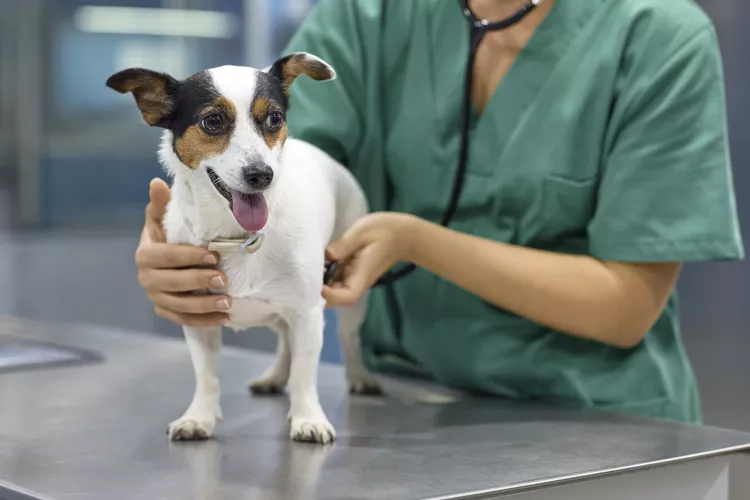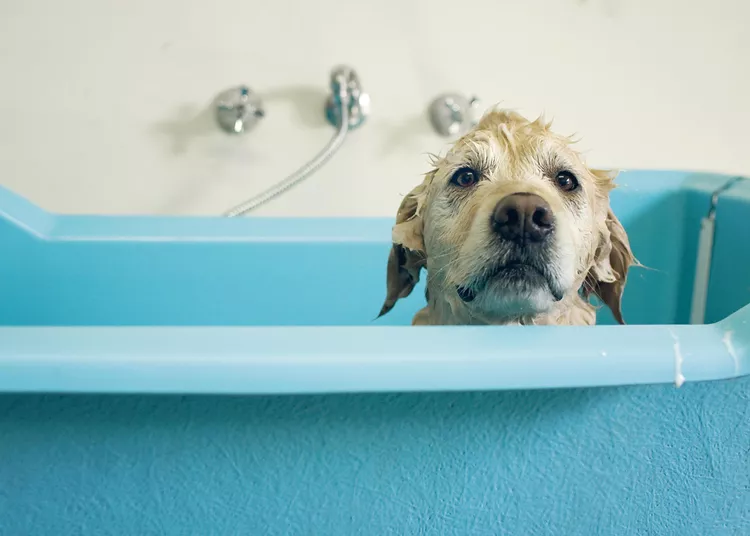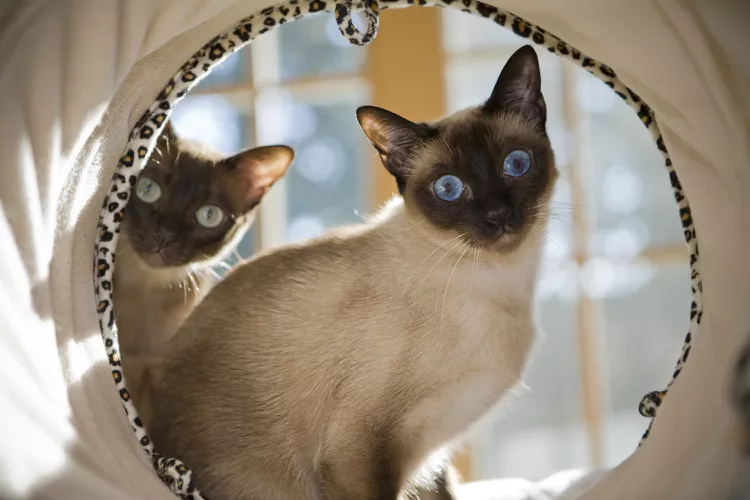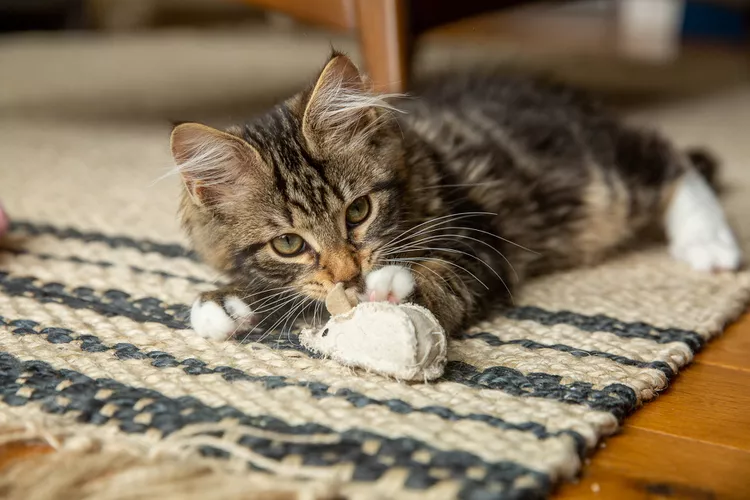
Do you have a stinky cat? Cats are generally known for their cleanliness. Most are fastidious self-groomers, which keeps them free of dirt and odors. However, you may sometimes find that your cat smells bad.
Perhaps your cat smells like pee or has bad breath. Maybe the smell ise coming from its rear end. Although some cat odors are harmless or easy to fix, others can mean there is a health problem. Here's what to know about these different types of odors—and how to help treat them.
The best way to figure out why your cat stinks is to determine the source of the odor. Is your cat just stinky around the head or face? The rear end? Do you notice an odor on a particular part of the coat or does it seem to be all over? Asking these questions is the first step in addressing the problem with your stinky cat. Once you know where to odor is coming from, you will have a better chance of helping your cat.
There are several potential reasons for bad odors in cats. Once you can determine the location of the odor, you may be able to figure out the root cause. In many cases, your cat will need to go to the veterinarian. If you are unable to determine the source of the odor, it's still important to contact your vet.
Some people assume it's normal for cats to have bad breath or halitosis. However, consistent bad breath in cats is usually a sign of a health problem. Temporary mouth odors may be caused by something the cat ate.
Dental disease is probably the most common cause of bad breath in cats. Plaque and tartar buildup has a foul odor due to its bacteria content. The buildup can cause gingivitis and lead to gum disease, leading to tooth loss.
Ulcers, growths, and wounds in the mouth can develop an unpleasant odor if left untreated. Bacteria in the mouth can make these worse. These lesions may be caused by stomatitis or some other problem. Not only are these very bad-smelling, but they are usually also very uncomfortable for the cat. Mouth odor can also develop with severe kidney disease or unregulated diabetes.
If the foul odor is coming from the area around the base of the tail, chances are it's a problem around the anus. Seek veterinary medical care if you suspect the following conditions below:
Flatulence is normal in humans and animals, and cats are no exception. If your cat is passing gas frequently or it has an extremely bad smell, there may be a gastrointestinal problem.
Diarrhea can leave traces of loose stool around the rear end. It may be difficult for the cat to keep up with grooming if diarrhea keeps happening. If your cat has had diarrhea for two or more days, it's time to see a veterinarian.
Constipation causes stool to back up in the colon, making the cat strain to defecate. The hard, impacted stool might not pass, but sometimes liquid stool can pass. This can get on your cat around the rear end and tends to smell especially foul. This is a very uncomfortable situation for the cat and is sometimes a sign of a more serious health issue.
Anal glands are tiny sacs located just outside a cat's anus. They contain an oily, putrid, somewhat fishy-smelling fluid that is normally expressed during defecation. The fluid may also be released during acute fear, stress, or excitement (similar to a skunk's scent glands). In some cases, the anal glands can become inflamed, infected, or impacted. Some of the fluid can seep out, leaving a very foul odor on a cat that doesn't seem to go away. These cats may scoot and rub their rear ends or lick the anus obsessively.
Perianal fistulas are wounds in and around the anal area that have a tunnel-like structure. Though these are relatively uncommon in cats they can be very serious. Perianal fistulas as extremely uncomfortable and highly malodorous. They can lead to or occur in conjunction with other GI problems and often require surgical treatment.
If your cat's odor seems to be coming from all over the body, then it might be a problem with the skin and coat. A bath may help if your cat is noticeably dirty. However, if your cat looks relatively clean, there may be something deeper going on. Seek veterinary medical care to address the skin condition in your cat.
Skin infections can cause a cat to have a bad smell all over. If the infection is serious, the cat may have a thinning coat and visibly irritated skin. You may notice a greasy, smelly coating on your hands after petting a cat with a major skin infection. The odor is typically caused by bacterial or fungal overgrowth.
Wounds on the skin may stay hidden under the hair and become infected. This may cause a foul-smelling discharge (pus) to seep out of the wound. If your cat's body smells bad and you can't seem to find the source, try running your fingers through the coat and looking for wounds. If you find one, see your vet as soon as possible.
Ear infections are caused by an overgrowth of yeast, bacteria, or ear mites in the ears. Beside scratching and head-shaking, you may notice that your cat's ears smell horrible. Have a look inside to see if there is debris present as this is often a sign of an ear infection. Be sure to visit your vet soon to determine if an ear infection is present and to begin appropriate treatment.
Cat urine has a very strong ammonia-like smell that can smell even worse when there is a problem. Urinary tract infections can cause the urine to smell especially putrid. Incontinence or the inability to control urination can result in your cat smelling like urine or pee. If your cat smells like urine, it's important to see the vet to determine the cause.
If your cat is straining to urinate but not passing urine, this is an emergency. Your cat may be blocked. Urinary obstructions are extremely life-threatening. Bring your cat to the nearest open vet immediately.
Remember that cats are experts at masking illness. By the time you notice any signs of illness, things might be very serious. Be sure to contact your vet at the earliest signs of illness or if you detect an unusual odor that is not going away.

10 Obscure, Little-known Canine Facts in Honor of National Dog Day
With National Dog Day upon us, it's time to celebrate everything about our favorite pets—even the weirder stuff. Here are 10 obscure facts about dogs you probably didn't know.
Exploring the Different Types of Pet-Friendly Beaches
Are you looking for pet-friendly beaches? Learn about the different types of pet-friendly beaches, their locations, and tips for visiting them with your pet.
Toxic Chemicals & Household Items That Can Poison Dogs
There are many things in and around your home that can endanger your dog. Learn which chemicals and household items can poisin your dog.
Bronchitis in Dogs
Is your dog coughing and feeling unwell? It could be due to respiratory inflammation called bronchitis. Learn the causes, treatment, and prevention.
Choking in Dogs
A dog can occasionally swallow something incorrectly and start choking. Find out how you can tell if your dog is choking and what you can do about it.
Why Does My Dog Smell So Bad?
Does your dog smell? Find out what could be causing these unpleasant odors and if it's something that needs more than just a bath to fix.
Is Rosemary Safe for Dogs?
Rosemary is used both for cooking and as a supplement with many reported health benefits in people, so you may be wondering if it is safe to give to your dog. Rosemary is considered non-toxic for dogs but with some caveats.
Can Dogs Eat Blueberries?
Dogs can safely eat blueberries. Blueberries are packed with nutrients and can be a great addition to your dog's diet when fed in moderation. Learn more about the benefits, risks, how to incorporate blueberries into their diet, and other fruits dogs can eat.
Dog Food Basics
Are you feeding your dog the best way possible? Check out these dog feeding tips to keep your dog healthy and happy.
Swedish Vallhund: Dog Breed Characteristics & Care
The Swedish vallhund makes for a high-energy and affectionate companion. Learn about the breed's history, health, exercise needs, and more.
Becoming a Show Dog: Getting Started
Do you have the perfect puppy? Have you considered showing her in a dog show? There's much more to showing than showing up! Here's how to get started.
How to Care for a Hairless Cat
Hairless cats make great pets but they aren't without their own challenges and requirements. Read on to learn how to best care for your furless feline.
British Shorthair: Breed Profile, Characteristics & Care
The British Shorthair is a calm, affectionate cat that looks and feels like a plush teddy bear. Here's what you need to know about this popular breed, including appearance, temperament, health, and care.
Tonkinese: Cat Breed Profile, Characteristics & Care
The Tonkinese cat is a perfect mix of the Siamese and Burmese—smart, sociable, and sweet. Learn about the Tonkinese breed.
How to Stop Your Cat From Chewing Electrical Cords
Cats are known to pounce and attack inanimate objects, like electrical cords. Learn how to prevent your cat from ambushing objects that may harm it.
How to Stop Aggression in Kittens
Kittens may show aggressive behavior for several reasons. Sometimes their play gets too aggressive while other times the kitten is afraid or upset. Learn how to spot and curb aggression in kittens.
46 Egyptian Cat Names
Whether inspired by notable Egyptian deities, locales, or pharaohs, Egyptian cat names can bring out the divinity of your noble feline companion.
How to Tell If a Kitten is a Boy or a Girl
If you're wondering whether your new kitten is a boy or a girl, here are three ways to help determine the sex of your cat.
Signs Your Cat Is Aging and When to See the Vet
Expect some changes when your cat ages. Learn to differentiate between normal and potential medical problems for your elderly cat.
Coronavirus in Cats
Feline coronavirus (FCoV) rarely harms cats but can lead to another life-threatening illness. Learn the causes, treatment, and prevention.